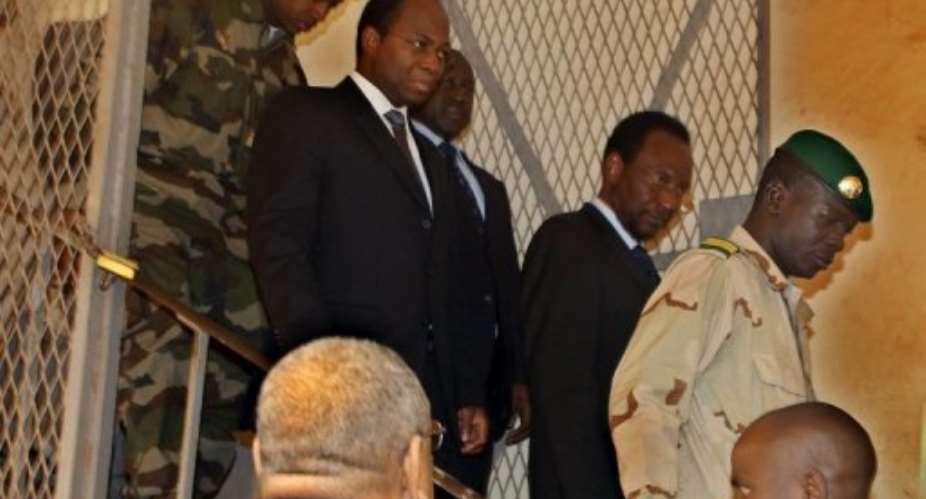BAMAKO (AFP) - The military behind the Mali coup last month on Wednesday arrested two more politicians, even as a newly-appointed interim prime minister weighed the make-up of a new government.
As the junta leaders carried out their show of force, there was more bad news from the country's desert north, where the political chaos has allowed rebel forces to make huge gains in recent weeks.
The United Nations humanitarian office said some 268,000 people had now fled northern Mali, which was seized by Tuareg rebels and Islamists in the days following the March 22 putsch.
In the capital, a member of leading opposition party the Democratic Alliance of Mali, Kassoum Tapo, was arrested by armed men "in a public place" Tuesday night and taken to the coup leaders' military barracks, a relative told AFP on condition of anonymity.
And Tieman Coulibaly of the Democracy and Development Union was arrested at his home, his party said.
The coup leaders were already holding several top officials -- including ex-prime minister Modibo Sidibe and Soumaila Cisse, a former minister who led the West African Economic and Monetary Union until last November.
The soldiers agreed to hand power back to civilians, and the arrests have signalled they do not want to be sidelined from the political process.
Interim president Dioncounda Traore on Tuesday named a noted astrophysicist as his prime minister, Cheick Modibo Diarra -- who worked on several space exploration missions for NASA -- and who is expected to announce the members of his government in coming days.
Traore's aides said he had no prior knowledge of the raid in which the political figures were arrested.
In a statement released late Tuesday, Colonel Moussa Sinko Coulibaly, an adviser to the junta head, confirmed that "civil and military figures" had been picked up on the basis of "serious information."
Investigations into the activities of those seized were underway and legal action may be taken against them, he added, without identifying the detainees or saying how many had been arrested or what they were accused of.
A Malian security source said the arrests would be explained "when the time comes."
Both Sidibe and Cisse were leading candidates in a presidential election set for April 29 that was derailed by the coup.
"The arrest (of Cisse) clearly shows the junta's desire to not cede power to civilians," the former minister's office said in a statement sent to AFP in Dakar.
Police chief Mahamadou Diagouraga, former defence minister Sadio Gassama and Hamidou Sissoko, a top aide to ousted president Amadou Toumani Toure, were among the others arrested.
The FDR, grouping political parties and civil society groups, accused the junta of of seeking to instil "a climate of terror".
A statement from European Union foreign policy chief Catherine Ashton's office demanded the "immediate release" of Sidibe and the others, calling for "urgent clarification" regarding the circumstances of their arrest.
Besides dealing with the junta, Diarra will have to negotiate with the Tuareg and Islamist rebels as well as various criminal groups who took advantage of the coup to overrun much of the country's north.
Initial contacts have been made with some of the groups since Traore's inauguration, and he has vowed "total and implacable war" if talks fail.
The low-ranking army officers who staged the putsch justified their action by denouncing the government's ineffective resistance to the Tuareg rebellion, which was rekindled in January.
The coup prompted the rebels, joined by Islamists, to capture an area roughly the size of France, including the ancient town of Timbuktu.
The main Tuareg rebel group Azawad National Liberation Movement (MNLA) then declared an independent state, drawing international condemnation.
A member of MNLA's political branch said Monday that a first official meeting between the rebels and Malian authorities had gone well and mooted the possibility of a federation.
Under the constitution, an interim presidency should last only 40 days, but the ECOWAS-brokered deal recognised that it could take longer to organise new elections and return Mali to constitutional rule.





 Supreme Court clears way for dual citizens to hold key public positions
Supreme Court clears way for dual citizens to hold key public positions
 Be transparent, don’t suppress the truth – Prof. Opoku-Agyemang to Jean Mensa
Be transparent, don’t suppress the truth – Prof. Opoku-Agyemang to Jean Mensa
 ‘I won’t tell the world I was only a driver’s mate during challenges’ – Prof Jan...
‘I won’t tell the world I was only a driver’s mate during challenges’ – Prof Jan...
 We’ll prosecute corrupt officials of Akufo-Addo’s govt – Prof Jane Naana
We’ll prosecute corrupt officials of Akufo-Addo’s govt – Prof Jane Naana
 [Full text] Acceptance speech by Prof Jane Naana Opoku-Agyemang as 2024 NDC Runn...
[Full text] Acceptance speech by Prof Jane Naana Opoku-Agyemang as 2024 NDC Runn...
 Election 2024: Don’t be complacent, we haven’t won yet – Asiedu Nketia cautions ...
Election 2024: Don’t be complacent, we haven’t won yet – Asiedu Nketia cautions ...
 Election 2024: Stop fighting over positions in Mahama’s next govt – Asiedu Nketi...
Election 2024: Stop fighting over positions in Mahama’s next govt – Asiedu Nketi...
 Prof Jane Naana Opoku-Agyemang will restore dignity of vice presidency – Fifi Kw...
Prof Jane Naana Opoku-Agyemang will restore dignity of vice presidency – Fifi Kw...
 'Ghana beyond aid' has turned out to be 'Ghana without compass' – Naana Opoku-Ag...
'Ghana beyond aid' has turned out to be 'Ghana without compass' – Naana Opoku-Ag...
 Nation builder Mahama will deliver on his promise of a 24-hour economy for the b...
Nation builder Mahama will deliver on his promise of a 24-hour economy for the b...
